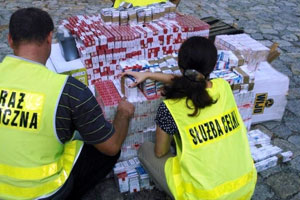An Irish member of the European Parliament has said that the anti-illegal trade agreements between the four major multinational tobacco manufacturers, the EU Commission and member states should be confined to the dustbin.
The agreements were aimed at cracking down on the illegal trade in cigarettes by requiring the four companies to secure their supply chains through marketing and tracking-and-tracing systems, and to make two types of payment to the European Commission and the member states of the EU.
These payments comprised annual fixed sums payable from 2004 up to 2030, ranging from US$200 million to US$1 billion; and ‘seizure payments’ equivalent to 100 percent of the evaded taxes for seizures of genuine (not counterfeit), diverted products above quantities of 50,000 cigarettes in one haul, rising to 500 percent if total annual seizures exceed 150-450 million cigarettes.
The payments to the EU, which go mostly to member states but also to the Commission, are in theory for use in fighting the legal trade but they are not earmarked for that purpose.
In an opinion piece in The Parliament Magazine, Nessa Childers said that dealing with cancer in Europe meant dealing with its causes at the source, but that there remained a set of measures that had not been implemented, even though there were no excuses for not having done so.
‘These measures concern tobacco smoke, the single most preventable cause of cancer worldwide, she said. ‘Such measures would not only be extremely cost-effective as part of our prevention strategy, they would also hold out the prospect of increasing urgently needed revenue to our public coffers.
‘The infamous PMI Agreements on fake and smuggled cigarettes between the EU, member states and the tobacco industry are due to lapse this year. We should take this opportunity to confine them to the dustbin of public policy history.
‘We have empowered the industry to self-police cigarette smuggling without independent verification. Therefore, it will come as no surprise that the vast majority of seizures are declared as counterfeit. If they were not, then the industry would owe the exchequer duty on the smuggling of their own wares….’
However, it was reported last month that the Commission had said in answer to a parliamentary question that there had been no evidence of incorrect reporting by tobacco manufacturers in relation to the provenance of cigarettes seized within the EU.
‘It is important to note that there has been no evidence of incorrect reporting by the manufacturers,’ the Commission said as part of its answer. ‘One particular member state has verified 123 assessments made by manufacturers, and not found any error.’











